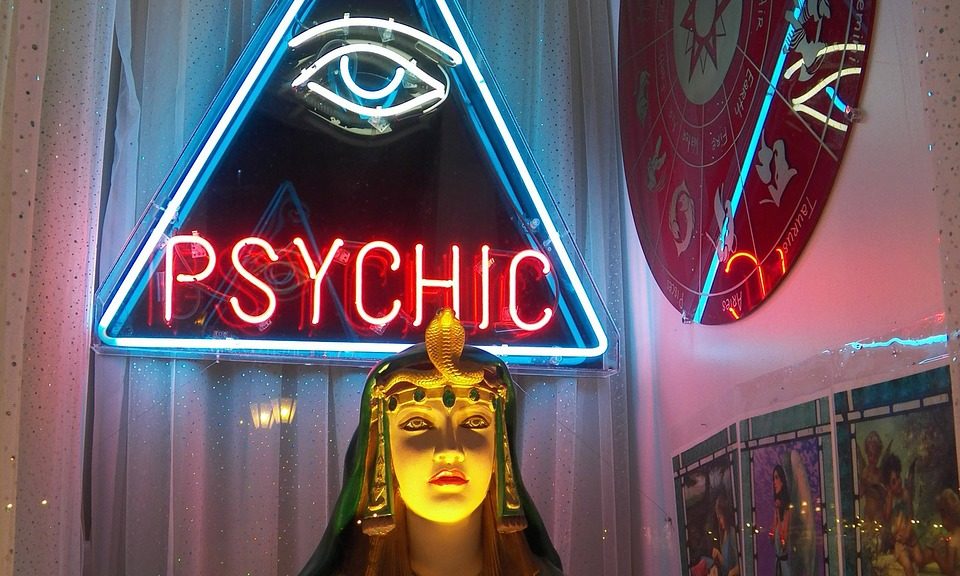Celebrating Winternight
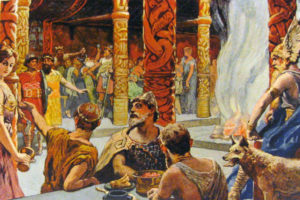 I ran into this post by the 21st Century Viking about Winternight, and I got a good feeling about it. I could understand the writer’s general feelings about Samhain, seeing as I really don’t have much love for the holiday. But what fired me up was her wording:
I ran into this post by the 21st Century Viking about Winternight, and I got a good feeling about it. I could understand the writer’s general feelings about Samhain, seeing as I really don’t have much love for the holiday. But what fired me up was her wording:
For the Ancient Vikings this was a time to celebrate, this was the beginning of winter. They had come home from raiding and trading, winter was starting, and they were going to start the Winter Hunting.
Winter Hunting? Oh yes, count me in!
Winter Hunting after Winternight
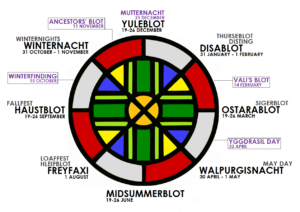 Yes, I know Winternight is something from Stephen McNallen, and while I am not a big fan of AFA, I’m not against the holiday of Winternight, per se. It makes a certain amount of sense to me to mark the end of summer activities and go into autumn/winter activities. Like 21st Century Viking, I’ve never been fond of Samhain, so it stands to reason that something like Winternight appeals to me. Perhaps what’s missing is Winter Hunting, which I could totally get behind, because I hunt as a semi-subsistence hunter.
Yes, I know Winternight is something from Stephen McNallen, and while I am not a big fan of AFA, I’m not against the holiday of Winternight, per se. It makes a certain amount of sense to me to mark the end of summer activities and go into autumn/winter activities. Like 21st Century Viking, I’ve never been fond of Samhain, so it stands to reason that something like Winternight appeals to me. Perhaps what’s missing is Winter Hunting, which I could totally get behind, because I hunt as a semi-subsistence hunter.
I had been in a fairly foul mood recently because the clock is ticking for me to get my animals into the freezer and I lost two precious hunting days due to family obligations. I realize that it’s just fate, and no matter how well you plan for something, life inevitably intrudes. It’s the chaos factors at play here. What should’ve been six animals in my freezer are only three because of yours truly, problems with “buck fever,” (look it up) and bad luck. I can look in the mirror every day at whose fault it is–is that Loki behind me?– but one must treat each hunting day as a new day. Last year, I brought home the majority of the meat, but this year looks sparse.
So, with Winternight, we’re entering the Winter Hunting cycle, and I hope I can make more successful so we’ll have enough food for the year. Otherwise, I may have to get creative on buying meat. The warm Indian Summer days evaporated on Halloween, and we’re now in the cold and wet phase of the season.
Hunting, NOT Shopping
For those of you who do not hunt, let me say that hunting isn’t shopping. You go where you hope there are animals — and you hope you can get close enough to humanely shoot one. I say humanely because neither I nor my husband want an animal to suffer. We want a clean, fast kill.
Wild animals generally don’t stand still for you to shoot. Once they figure you out, they beat feet to  the next county–or next country, for that matter. Having gotten within 300 yards (that’s three football fields) of a pronghorn antelope I was trying to shoot and having the entire herd bust us and run away at 60 miles per hour (second fastest land animal), let me say, it has been more than frustrating.
the next county–or next country, for that matter. Having gotten within 300 yards (that’s three football fields) of a pronghorn antelope I was trying to shoot and having the entire herd bust us and run away at 60 miles per hour (second fastest land animal), let me say, it has been more than frustrating.
300 yards. Sigh. They looked microscopic in my scope. They were out of my comfort range, so I didn’t take the shot. The days I counted on hunting antelope seemed to evaporate quickly. I just have a few more days and then the antelope season disappears for this year.
When Skadi Helps You Out
 So, I’m running late to get to an appointment. I’m cold, I’m tired, and I’m sore from chasing animals in the back country. I literally get in the car and am about to turn the key when I look up. About fifty yards away from the truck is a buck. A legal buck. In a safe place with good angles, if I shot him. The only bad side of the entire thing is that, well, I’m in my truck. Without my rifle, orange, or tags. And I’m late, late, late to an appointment. Oh, and if he leaves, he’s going down a 50 plus foot embankment, and assuming I hit him, I’m going to have a Hel of a time trying to get him out of there by myself until my husband comes home.
So, I’m running late to get to an appointment. I’m cold, I’m tired, and I’m sore from chasing animals in the back country. I literally get in the car and am about to turn the key when I look up. About fifty yards away from the truck is a buck. A legal buck. In a safe place with good angles, if I shot him. The only bad side of the entire thing is that, well, I’m in my truck. Without my rifle, orange, or tags. And I’m late, late, late to an appointment. Oh, and if he leaves, he’s going down a 50 plus foot embankment, and assuming I hit him, I’m going to have a Hel of a time trying to get him out of there by myself until my husband comes home.
What would Skadi do? (WWSD?)
What would Skadi do? I could reschedule the appointment, but not the buck. I got out of the truck and went back inside. I knew damn well that deer would vanish by the time I  got my rifle and orange, but I got them anyway. I walked out of the house. He was still there. I walked down the drive to get a better shot and to ensure I wasn’t going to hit anything I didn’t intend on hitting. He just stood there watching me.
got my rifle and orange, but I got them anyway. I walked out of the house. He was still there. I walked down the drive to get a better shot and to ensure I wasn’t going to hit anything I didn’t intend on hitting. He just stood there watching me.
I aimed and pressed the trigger. No buck fever. No shaking. Just me and the buck. Nothing. Shit. I forgot to take the safety off. Again, lined up on him. Pressed the trigger. Loud boom and the buck dropped right then and there. No fuss, no muss. I went over to him and was about to put another round into him, only, he stopped moving and died right where he had stood. I thanked him and Skadi. As I’ve said, wild animals don’t hang around once they figure you out. The only thing I could think of was that the slack wind might have kept him from smelling me. Either that or Skadi wanted me to have him.
Now the Work Begins
After tagging the critter, I went back inside and rescheduled my appointment. Then, there was the little problem of getting such a big animal to my house. I thought about gutting him right there, but I really didn’t want a bear so close to my house. (Yeah, I live that close to the back country.) So, I drove my truck to him. Only, he was beyond heavy. I’m guessing he was close to 200 lbs. It took me two hours to get him into the house to gut and skin him. By the time my husband got home, I was finally pulling off the backstraps. It took me three more hours to gut, skin, and quarter by myself because I’m used to doing this with someone else.
So, I have a quartered deer waiting for me to butcher. And blood everywhere. And I do mean EVERYWHERE. I had to wash my clothes, hoping the blood would come out. Hel, I left bloody footprints all over the house. Thank the gods I have tile and not carpet.
Skadi asked me for the liver, which I will oblige. Beyond that, I at least have put bullet into animal and came away with more food right after Winternight. And now I have four animals down, which means I still must get more if I’m to get enough meat for the year.
Winter hunting. Yeah, it’s kind of like that.


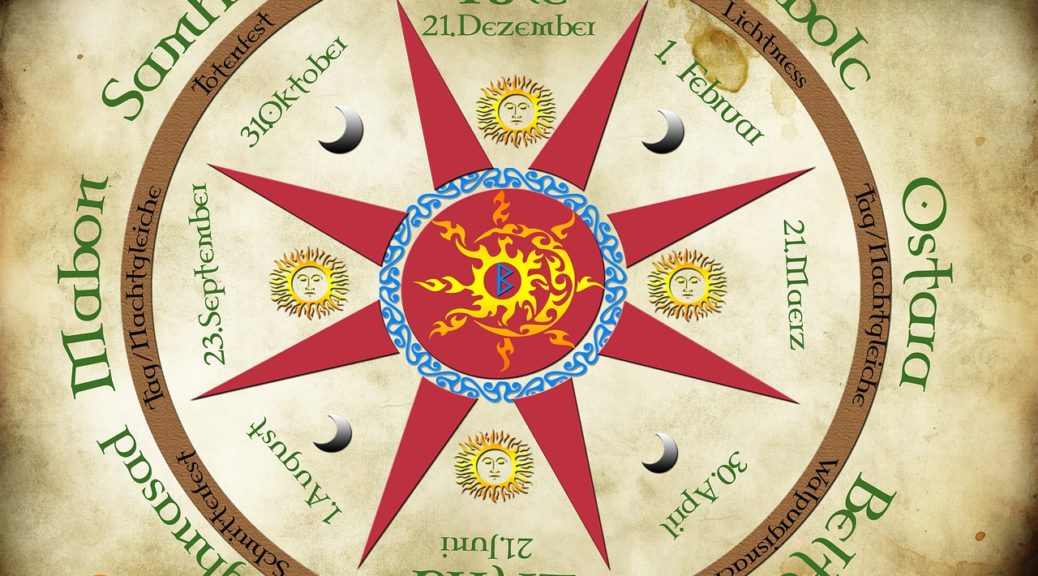
 Ah the joys of Samhain and the muddled mix of goddesses and pantheons that the Wiccans bring. Don’t get me wrong — I’m a person who believes the Heathen gods and goddesses are the same as gods and goddesses with different names in other pantheons. However, there are differences and I’m not into simply playing the mix-and-match game that many pagans do.
Ah the joys of Samhain and the muddled mix of goddesses and pantheons that the Wiccans bring. Don’t get me wrong — I’m a person who believes the Heathen gods and goddesses are the same as gods and goddesses with different names in other pantheons. However, there are differences and I’m not into simply playing the mix-and-match game that many pagans do.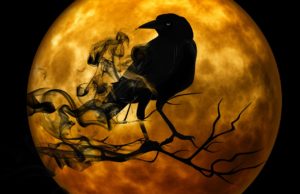 without respect for each culture and pantheon. That smush Zoroastrianism with Celtic beliefs and call it good. Or that brings in Christian, Egyptian, and Norse gods and beliefs together in a type of melange that is quite unpalatable.
without respect for each culture and pantheon. That smush Zoroastrianism with Celtic beliefs and call it good. Or that brings in Christian, Egyptian, and Norse gods and beliefs together in a type of melange that is quite unpalatable.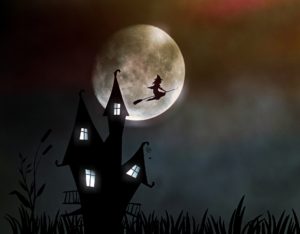 Samhain was the Celtic/Gaelic new year which is a lot like our Yule (which, incidentally, the Wiccans also celebrate.) Harvest was an important time for them, and Wiccans believe that the veil between the living and the dead thins during this time. Yule, on the other hand, deals with the the darkest times of the year, if you’re in the Northern Hemisphere, which is more in turn with the concept of the “Veils.”
Samhain was the Celtic/Gaelic new year which is a lot like our Yule (which, incidentally, the Wiccans also celebrate.) Harvest was an important time for them, and Wiccans believe that the veil between the living and the dead thins during this time. Yule, on the other hand, deals with the the darkest times of the year, if you’re in the Northern Hemisphere, which is more in turn with the concept of the “Veils.”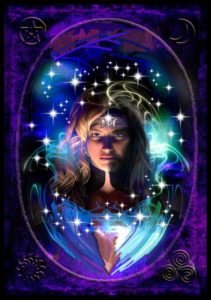 be sure, but when you mix different systems, you can’t help but lose some of the authenticity. If you’re a Wiccan, I mean no insult. I like people who are Wiccans as much (and sometimes more) than some Heathens I know. Even so, you’re in Wicca for the magic and witchcraft. I get that. We have our own (ahem) “magic,” but it isn’t necessarily the spell variety. In fact, it’d be nice if Heathens did court the Wiccans to get some of their numbers in ours. (I guess we won’t do that by calling them “Heathen Lite,” eh?)
be sure, but when you mix different systems, you can’t help but lose some of the authenticity. If you’re a Wiccan, I mean no insult. I like people who are Wiccans as much (and sometimes more) than some Heathens I know. Even so, you’re in Wicca for the magic and witchcraft. I get that. We have our own (ahem) “magic,” but it isn’t necessarily the spell variety. In fact, it’d be nice if Heathens did court the Wiccans to get some of their numbers in ours. (I guess we won’t do that by calling them “Heathen Lite,” eh?)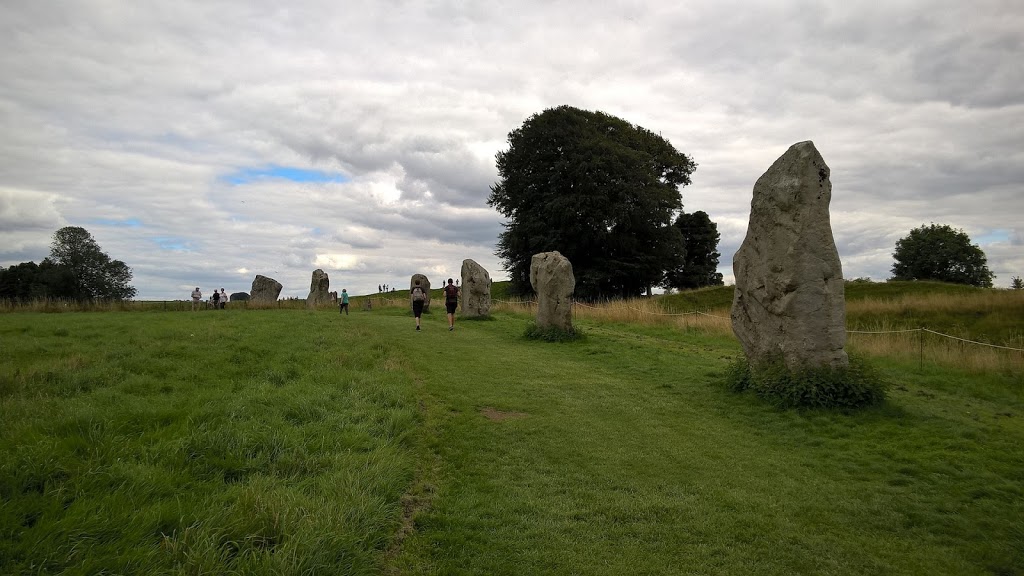
 Before I get into the supposition that the gods are with us, let me address the personal nature of the gods, themselves. There are Heathens who believe that our gods really aren’t personal deities. That the concept of a personal deity comes from Christianity and those concepts taint our modern day beliefs.
Before I get into the supposition that the gods are with us, let me address the personal nature of the gods, themselves. There are Heathens who believe that our gods really aren’t personal deities. That the concept of a personal deity comes from Christianity and those concepts taint our modern day beliefs. 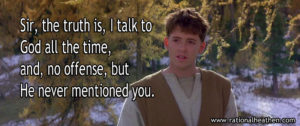 These aforementioned gods that have very little to do with humanity are not the gods I am talking about. The gods I am talking about are the gods who have made themselves known to humans. Who still make themselves known to humans. Odin, Thor, Freyja, Freyr, Tyr, Loki, Baldr, Skadi, Ullr, Heimdallr,…the list goes on. We would not know them if we did not have contact with them. Sure, you could say that hearing thunder and calling it a god is the basis for Thor, but then, why bother to have positive connotations with a thunder god if he didn’t somehow look benevolently on humans?
These aforementioned gods that have very little to do with humanity are not the gods I am talking about. The gods I am talking about are the gods who have made themselves known to humans. Who still make themselves known to humans. Odin, Thor, Freyja, Freyr, Tyr, Loki, Baldr, Skadi, Ullr, Heimdallr,…the list goes on. We would not know them if we did not have contact with them. Sure, you could say that hearing thunder and calling it a god is the basis for Thor, but then, why bother to have positive connotations with a thunder god if he didn’t somehow look benevolently on humans? are reserved and only show up at times they deem is suitable. They seldom come when you call –remember, they’re not your bitches. Even if you ask nicely, you can get complete crickets. They may have more important things to pay attention to. Like the entire universe.
are reserved and only show up at times they deem is suitable. They seldom come when you call –remember, they’re not your bitches. Even if you ask nicely, you can get complete crickets. They may have more important things to pay attention to. Like the entire universe. benevolent intentions, you should definitely get a name or an understanding of who or what they are. They shouldn’t be passing themselves off as a god. If they are, I wouldn’t want to deal with them simply because of the dishonesty.
benevolent intentions, you should definitely get a name or an understanding of who or what they are. They shouldn’t be passing themselves off as a god. If they are, I wouldn’t want to deal with them simply because of the dishonesty.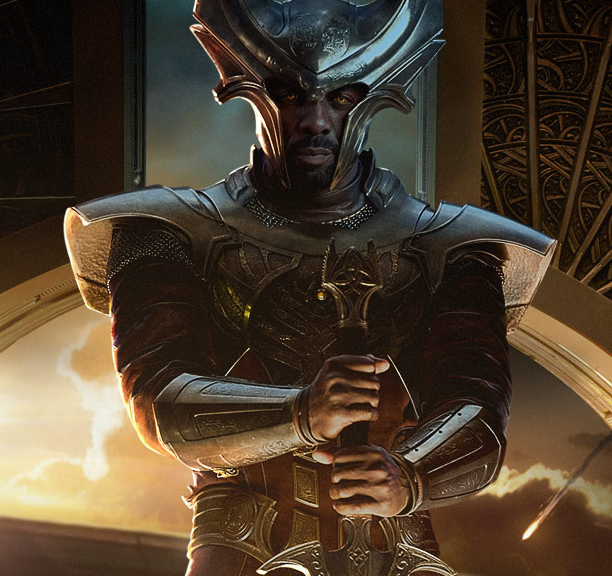
 in Heathenry. Never mind that I’ve been stating what I have been stating as long as I’ve had this blog, which puts me in direct opposition of folkish beliefs. Why? Because scientifically, archaeologically, anthropologically, and historically, none of the folkish beliefs have any basis in fact. Unless you count the past 100 years as a reason to be folkish, i.e. Nazi beliefs, there is no record of exclusion from Heathenry.
in Heathenry. Never mind that I’ve been stating what I have been stating as long as I’ve had this blog, which puts me in direct opposition of folkish beliefs. Why? Because scientifically, archaeologically, anthropologically, and historically, none of the folkish beliefs have any basis in fact. Unless you count the past 100 years as a reason to be folkish, i.e. Nazi beliefs, there is no record of exclusion from Heathenry. What Folkish Beliefs Are
What Folkish Beliefs Are one place for a while before pushing on. We know that many of them were most likely black (even though there isn’t a specific gene for being black) due to the genetic material that we have found. Our species is black in Africa to provide some protection against the sun’s rays. As humans moved up north, our skin lightened to adjust to the lack of sunlight so that our bodies could make Vitamin D.
one place for a while before pushing on. We know that many of them were most likely black (even though there isn’t a specific gene for being black) due to the genetic material that we have found. Our species is black in Africa to provide some protection against the sun’s rays. As humans moved up north, our skin lightened to adjust to the lack of sunlight so that our bodies could make Vitamin D.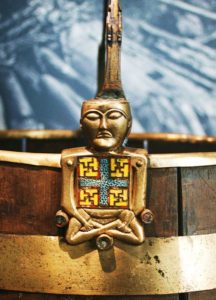
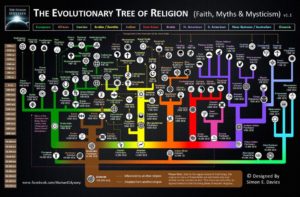 back them up in the links provided above), Heathens were pretty willing to take in others who swore allegiance to their leaders and their gods. It made a kindred stronger.
back them up in the links provided above), Heathens were pretty willing to take in others who swore allegiance to their leaders and their gods. It made a kindred stronger.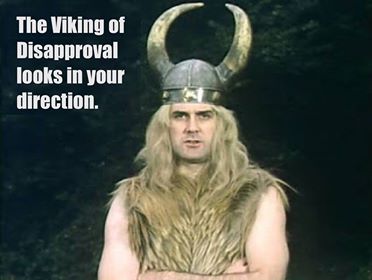 differentiate where you came from. What they did care about was your religion and your loyalties. What was your kindred and whether you were a friend or foe. Given the overall dissemination of Nordic genes, we can assume that everyone had ancestors that lived in the overall Viking sphere of influence, including African tribes and Mongols. Even if this weren’t so, if someone who joined up with the Vikings, raided with them, and worshiped their gods, you can bet they would’ve had status in a kindred.
differentiate where you came from. What they did care about was your religion and your loyalties. What was your kindred and whether you were a friend or foe. Given the overall dissemination of Nordic genes, we can assume that everyone had ancestors that lived in the overall Viking sphere of influence, including African tribes and Mongols. Even if this weren’t so, if someone who joined up with the Vikings, raided with them, and worshiped their gods, you can bet they would’ve had status in a kindred. Folkish people, you may not be Nazis, but you are so on a razor’s edge with this. What you are doing is racism, pure and simple. If a black person hears the call of Thor, shouldn’t he or she be allowed to practice Heathenry? If the answer is “no, because of their ethnicity” then yes, I am calling you a bigot. Why can’t a black person be a Heathen? Don’t give me that’s not their religion — they should stick to African religions. That is complete and utter bullshit. Separate is NOT equal. We know this from history. People fought hard to end segregation, and you’re dragging Heathenry down with your bigoted beliefs.
Folkish people, you may not be Nazis, but you are so on a razor’s edge with this. What you are doing is racism, pure and simple. If a black person hears the call of Thor, shouldn’t he or she be allowed to practice Heathenry? If the answer is “no, because of their ethnicity” then yes, I am calling you a bigot. Why can’t a black person be a Heathen? Don’t give me that’s not their religion — they should stick to African religions. That is complete and utter bullshit. Separate is NOT equal. We know this from history. People fought hard to end segregation, and you’re dragging Heathenry down with your bigoted beliefs.
 Quick, without Googling, name five Heathen gods or goddesses other than Odin, Thor, Freyja, Loki, or Hel. Now, assuming you didn’t cheat, can you tell me whether they’re Aesir, Vanir, Alfar, or Jotunn? (Again without Googling.)
Quick, without Googling, name five Heathen gods or goddesses other than Odin, Thor, Freyja, Loki, or Hel. Now, assuming you didn’t cheat, can you tell me whether they’re Aesir, Vanir, Alfar, or Jotunn? (Again without Googling.)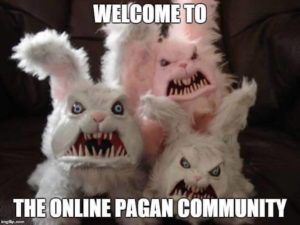 The other day, I was talking to an agnostic on Facebook (yeah, you know who you are) who quizzed me about being a real Heathen. I wasn’t really bothered by it, but it got me to thinking about the Neo-Heathens who have joined Heathenry from watching pop culture movies and TV shows about Vikings and the gods. (Marvel springs to mind.) I also started thinking about the tendency for certain people in our religion to declare themselves gatekeepers or Asa-popes. Inevitably, there’s a clash between the Asa-popes and the neo-Heathens, because the Asa-popes and Gatekeepers are annoyed with the neophytes. They are annoyed that someone would show interest in our religion because of some pop culture reference.
The other day, I was talking to an agnostic on Facebook (yeah, you know who you are) who quizzed me about being a real Heathen. I wasn’t really bothered by it, but it got me to thinking about the Neo-Heathens who have joined Heathenry from watching pop culture movies and TV shows about Vikings and the gods. (Marvel springs to mind.) I also started thinking about the tendency for certain people in our religion to declare themselves gatekeepers or Asa-popes. Inevitably, there’s a clash between the Asa-popes and the neo-Heathens, because the Asa-popes and Gatekeepers are annoyed with the neophytes. They are annoyed that someone would show interest in our religion because of some pop culture reference.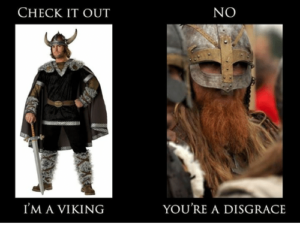 That would all be well and good, except Heathens are pretty much a drop in the overall pagan pool. We don’t have the numbers to turn anyone legitimately seeking knowledge away. (Except the neo Nazis, whom we really don’t want.) Heathenry and all its forms (with the exception of the white supremacists) might equal 250,000 in the world. If that.
That would all be well and good, except Heathens are pretty much a drop in the overall pagan pool. We don’t have the numbers to turn anyone legitimately seeking knowledge away. (Except the neo Nazis, whom we really don’t want.) Heathenry and all its forms (with the exception of the white supremacists) might equal 250,000 in the world. If that. My point is that people back then didn’t have a single view of the gods. Like now, they chose their own traditions and their own gods to believe in. The concept of organized religion occurred with the growth of cities and with priesthoods looking to grab power and keep themselves within the power structure. Sure, you had shamans and whatnot doing the power thing if you were in a tribe, but I suspect most Heathens revered ancestors and tutelary spirits, with an occasional major god or goddess thrown in for good measure.
My point is that people back then didn’t have a single view of the gods. Like now, they chose their own traditions and their own gods to believe in. The concept of organized religion occurred with the growth of cities and with priesthoods looking to grab power and keep themselves within the power structure. Sure, you had shamans and whatnot doing the power thing if you were in a tribe, but I suspect most Heathens revered ancestors and tutelary spirits, with an occasional major god or goddess thrown in for good measure.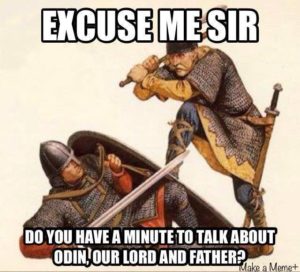 came to what kind of gods you worshiped was probably your own business and really not worried about, as long as you weren’t a dickhead about it. You were pretty much considered a Heathen if you believed in the Heathen gods–as far as we know, you didn’t get singled out because you believed that Thor was better than Odin, or you worshiped Perun or Frau Holle. Hel, our ancestors probably gave you a pass if you revered Loki as long as you were part of the kindred. When you started identifying with Christian ideals that were aimed at destroying Heathenism, that’s when they got a bit tetchy about it.
came to what kind of gods you worshiped was probably your own business and really not worried about, as long as you weren’t a dickhead about it. You were pretty much considered a Heathen if you believed in the Heathen gods–as far as we know, you didn’t get singled out because you believed that Thor was better than Odin, or you worshiped Perun or Frau Holle. Hel, our ancestors probably gave you a pass if you revered Loki as long as you were part of the kindred. When you started identifying with Christian ideals that were aimed at destroying Heathenism, that’s when they got a bit tetchy about it. What About Pop Culture Heathens?
What About Pop Culture Heathens?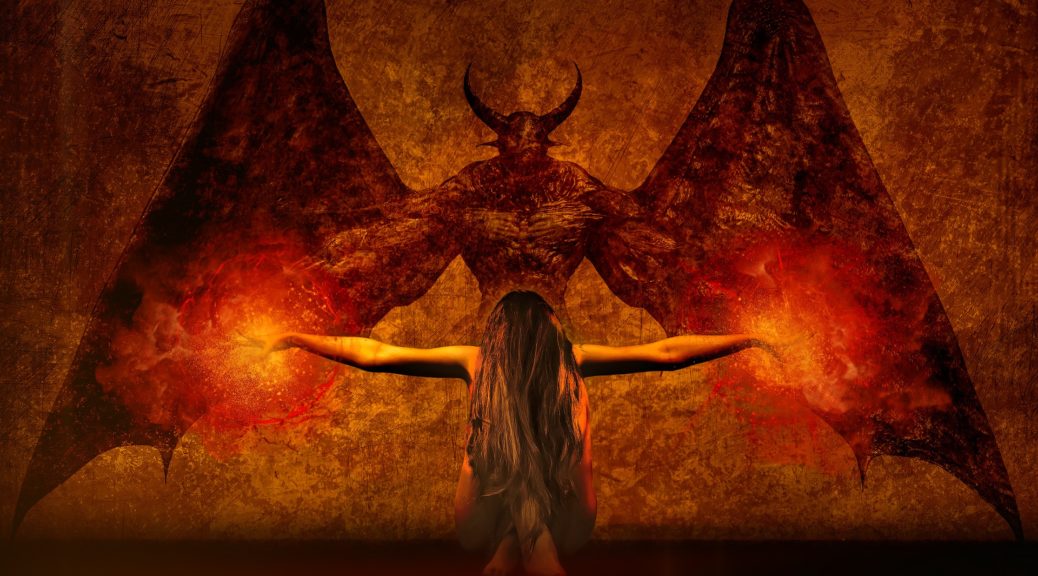
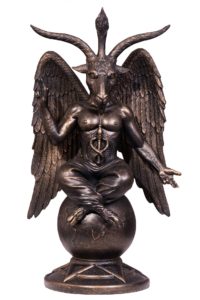 Today I’m throwing mud at another pagan religion, which probably will put me on their curse list. So be it. I don’t believe in that shit anyway, so cursing me won’t work.
Today I’m throwing mud at another pagan religion, which probably will put me on their curse list. So be it. I don’t believe in that shit anyway, so cursing me won’t work.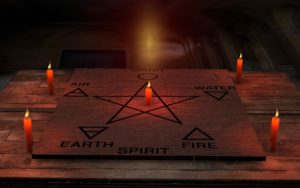 Does anyone see a problem with this? One
Does anyone see a problem with this? One 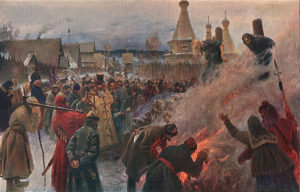 derivative not from pagan belief, but from a monotheistic belief. The exact monotheistic belief pagans are purportedly not believing in. It’s like saying, “I don’t believe in your god, but hey, we’re going to take the trappings and lore from your religion and use it however the hell it suits us.”
derivative not from pagan belief, but from a monotheistic belief. The exact monotheistic belief pagans are purportedly not believing in. It’s like saying, “I don’t believe in your god, but hey, we’re going to take the trappings and lore from your religion and use it however the hell it suits us.” I don’t believe in the Jewish and Christian god. I think it is a construct that came from one sect of the Canaanites that eventually became Jewish. They put their patron god Yahweh above all the other gods and came up with monotheism.
I don’t believe in the Jewish and Christian god. I think it is a construct that came from one sect of the Canaanites that eventually became Jewish. They put their patron god Yahweh above all the other gods and came up with monotheism.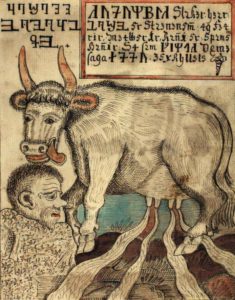 Zoroastrian, but honestly, aren’t you being a little narrow in your world views? I’ve heard that there were somewhere around 5000 different religions. Instead, you’re mixing Christianity, Zoroastrian, and Roman religions to come up with something you like?
Zoroastrian, but honestly, aren’t you being a little narrow in your world views? I’ve heard that there were somewhere around 5000 different religions. Instead, you’re mixing Christianity, Zoroastrian, and Roman religions to come up with something you like?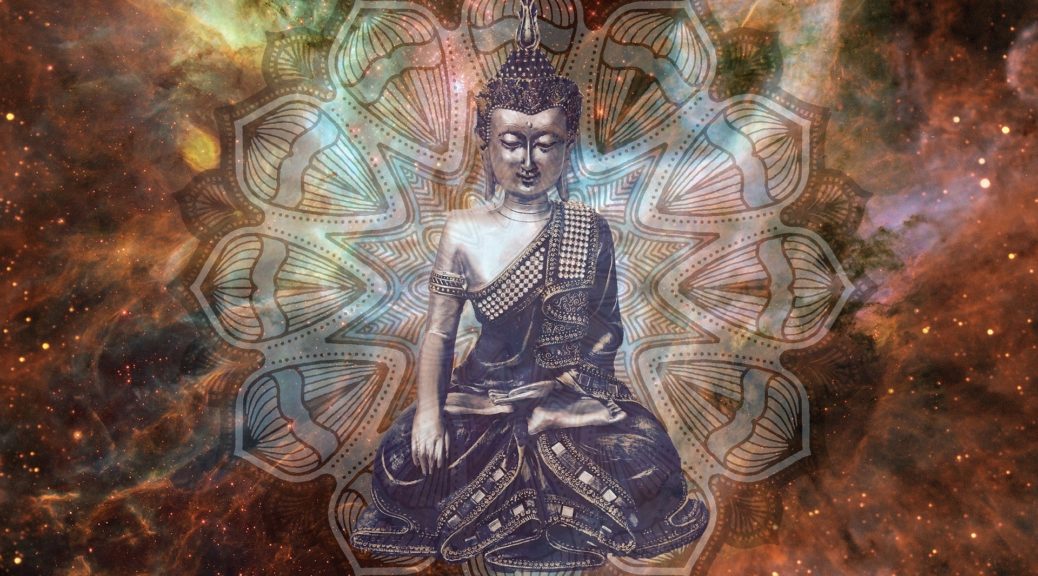
 You’ve been in a religion for some time. Or perhaps you’ve not been in a religion at all. Maybe it is Christianity; maybe it is another pagan religion. Perhaps you’ve been agnostic or even atheist. Or maybe you’re a Heathen like I am. Regardless, now you’re looking at a calling and…it’s not a god or goddess you follow. What do you do?
You’ve been in a religion for some time. Or perhaps you’ve not been in a religion at all. Maybe it is Christianity; maybe it is another pagan religion. Perhaps you’ve been agnostic or even atheist. Or maybe you’re a Heathen like I am. Regardless, now you’re looking at a calling and…it’s not a god or goddess you follow. What do you do?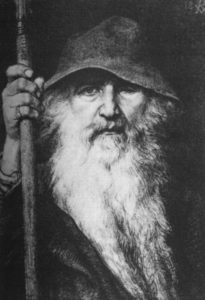 If you’re a Christian or someone who have been in the Abrahamic religions, this is often a complete shock. Same goes for atheists, who are more likely to think they’ve gone crazy hearing from a god or goddess. Depending on your religious upbringing, you may think the deity is some form of demon coming to tempt you away from the “One True God.” If you fall for the Yahweh argument, you’ll never get anywhere with this. Instead, you’ll turn down a potential positive and more personal relationship with the gods than you ever had with the god of the monotheistic cults.
If you’re a Christian or someone who have been in the Abrahamic religions, this is often a complete shock. Same goes for atheists, who are more likely to think they’ve gone crazy hearing from a god or goddess. Depending on your religious upbringing, you may think the deity is some form of demon coming to tempt you away from the “One True God.” If you fall for the Yahweh argument, you’ll never get anywhere with this. Instead, you’ll turn down a potential positive and more personal relationship with the gods than you ever had with the god of the monotheistic cults.
 You’ve gotten a call from a deity. Before you get all starry-eyed, think about what you’re committing yourself to. Is this god or goddess asking you to do something against your morals or against the law? Are they looking at having you harm someone or yourself? If the answer is yes, then say no and walk away. Take the high road here. Don’t be like Abraham who was asked to sacrifice his only son as a burnt offering because apparently Yahweh gets his rocks off watching humans squirm, even though he is supposedly omniscient and omnipotent. What was the purpose of THAT mindfuck? Tell me that. Don’t say to prove loyalty, because an omniscient and omnipotent god would already know the outcome.
You’ve gotten a call from a deity. Before you get all starry-eyed, think about what you’re committing yourself to. Is this god or goddess asking you to do something against your morals or against the law? Are they looking at having you harm someone or yourself? If the answer is yes, then say no and walk away. Take the high road here. Don’t be like Abraham who was asked to sacrifice his only son as a burnt offering because apparently Yahweh gets his rocks off watching humans squirm, even though he is supposedly omniscient and omnipotent. What was the purpose of THAT mindfuck? Tell me that. Don’t say to prove loyalty, because an omniscient and omnipotent god would already know the outcome. the Hel out of them and get a good feeling for who they are. Talk to priests or priestesses of that religion and get their take on your contact. Be aware that you may not have been contacted by a god, but by an ancestor, a wight, or some other denizen looking to make contact. When you do finally establish contact, find out what they want. If what they want isn’t against your moral code or the law, then you have to decide if you want them in your life. (If it is against your moral code or the law, run like Hel.) Above all, keep your head when this all occurs. You may have to step gracefully out of the relationship. Lastly, even if the god or goddess isn’t from your pantheon, you should still accept the contact if it is a favorable one. After all, the deity thought enough about you to visit.
the Hel out of them and get a good feeling for who they are. Talk to priests or priestesses of that religion and get their take on your contact. Be aware that you may not have been contacted by a god, but by an ancestor, a wight, or some other denizen looking to make contact. When you do finally establish contact, find out what they want. If what they want isn’t against your moral code or the law, then you have to decide if you want them in your life. (If it is against your moral code or the law, run like Hel.) Above all, keep your head when this all occurs. You may have to step gracefully out of the relationship. Lastly, even if the god or goddess isn’t from your pantheon, you should still accept the contact if it is a favorable one. After all, the deity thought enough about you to visit.



 Being mindful and paying attention to the land opens a whole new world of experiences you never knew existed. You start noticing not only the cooler temperatures of autumn setting in, but also the increase or decrease in humidity that follows the change. Maybe you start seeing stratus clouds and high cirrus replace the fluffy cumulus. Maybe you see a shift in the bird population, the increase or decrease of certain insects, or even the shift in the quality of light you get. Instead of noticing the latest fall fashions creeping into people’s wardrobes, you notice how the squirrels are moving from tree to tree to gather food. You may see different species of birds. If you live in a place with deer, you may see a shift in their foraging.
Being mindful and paying attention to the land opens a whole new world of experiences you never knew existed. You start noticing not only the cooler temperatures of autumn setting in, but also the increase or decrease in humidity that follows the change. Maybe you start seeing stratus clouds and high cirrus replace the fluffy cumulus. Maybe you see a shift in the bird population, the increase or decrease of certain insects, or even the shift in the quality of light you get. Instead of noticing the latest fall fashions creeping into people’s wardrobes, you notice how the squirrels are moving from tree to tree to gather food. You may see different species of birds. If you live in a place with deer, you may see a shift in their foraging. At this point, you may be wondering how this makes you a better Heathen. Let’s think about this a bit: our gods and the landvaettir are nature entities. Even Odin, who is our creator god, deals with natural forces. (How much more natural is the creation of life?) So, we’re looking at gods who reside over nature. By paying attention to things not human made, we gain a deeper understanding in the world around us. You become a better Heathen, and you even open yourself up to the wights and gods. It may or may not be a type of magic, but I know it works.
At this point, you may be wondering how this makes you a better Heathen. Let’s think about this a bit: our gods and the landvaettir are nature entities. Even Odin, who is our creator god, deals with natural forces. (How much more natural is the creation of life?) So, we’re looking at gods who reside over nature. By paying attention to things not human made, we gain a deeper understanding in the world around us. You become a better Heathen, and you even open yourself up to the wights and gods. It may or may not be a type of magic, but I know it works.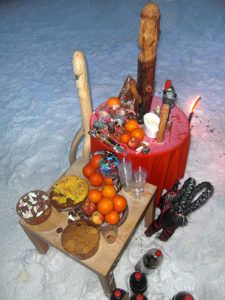 gods without all the mumbo-jumbo. In fact, I suspect it’s the best way to get in touch with the gods. You don’t get a conversation with the gods from mumbling prayers or sacrificing goats usually. You get that from opening yourself to them and seeing who pops up. That requires paying attention to them and listening to what they have to say.
gods without all the mumbo-jumbo. In fact, I suspect it’s the best way to get in touch with the gods. You don’t get a conversation with the gods from mumbling prayers or sacrificing goats usually. You get that from opening yourself to them and seeing who pops up. That requires paying attention to them and listening to what they have to say.